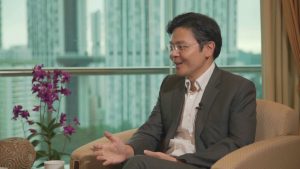The Singapore Government will not take a hands-off attitude to the property cycle and allow bubbles to develop. The Minister for National Development, Mr Lawrence Wong, said this at the Institute of Real Estate and Urban Studies (IREUS) Conference on ‘Real Estate and Urban Studies’on May 24.
 “Basically, we have concluded that the government cannot take a hands-off attitude to the property cycle and allow bubbles to develop – this is not what a responsible government should do.”
“Basically, we have concluded that the government cannot take a hands-off attitude to the property cycle and allow bubbles to develop – this is not what a responsible government should do.”
The Minister said that his Government’s aim is not to bring prices down by intervening in the property cycle but to steady the cycle and to stabilise the market – to have a steady and sustained property market, moving broadly in line with income growth.
“Imagine what the alternative would be – prices rise sharply; euphoria builds up; the very powerful force of FOMO – fear of missing out – kicks in, and people just for no rational reason start jumping on the bandwagon; then prices continue to rise further.
“Like in any bubble, this will be followed by a sharp decline in a few years’ time – perhaps when more supply enters the market, or when interest rates go up. Then, many more people will be hurt. In contrast, if we have an approach where there is a steady and stable property market, many more will benefit, with prices that rise steadily over time in line with fundamentals.”
Mr Wong explained that this will be his Ministry’s approach now with regard to the property cycle and the market in general. He added that it is a shift from the past where it tended to be more laissez-faire and hands-off. Mr Wong noted that Governments in other countries have also shifted with some being more effective at steadying the market than others.
“We have not quite moved to the extent of what Central Banks do with monetary policies and the business cycle. There you have a long history of intervention and a lot of literature about what works and what doesn’t work, what instruments to use, and how monetary policies can be effective at stabilising the business cycle. We are learning from our own experiences and what other countries have done; this is certainly an area where we can all benefit from more in-depth research and analytical work.”
Mr Wong said that with these changes in policy thinking and urban environment, investors have to consider what it means to buy property and the implications for property values. He explained that it is not just about property cycles and trying to time the market.
He cautioned that if investors try to “uy low, and then flip when prices are high”, especially when governments are trying to stabilise the market, they may be caught in the wrong property cycle. he asked investors to need to think more carefully about fundamental valuations over the longer-term.
Table of Contents
“Likewise, property developers and owners should be proactively looking at ways to create and enhance value in their real estate. You cannot continue with status quo, and assume that property prices will always just rise regardless of fundamentals. The old saying is that property is all about location – location is important, but good location alone may not be enough.
“Already, some property segments like retail are coming under severe pressure due to the rise of e-commerce, even in places with good locations, and this trend will just continue. Increasingly, real estate is not just about bricks and mortar. It is also about the full suite of urban solutions that can contribute towards greater value for customers and better urban living for people. Property developers and owners have to start thinking about that.”
Mr Wong explained that this is where innovation and technology are not just disruptors, but can also open up many new opportunities. He said that the rise of Prop Tech or Urban Tech, is attracting a significant share of global venture capital investments.
“It opens up many new areas of opportunities and growth. For example, how to think about designing more adaptable and flexible spaces, especially with changing economic needs; how building designs can be more adaptable and flexible; how to have better solutions for last mile delivery and urban logistics – a big growing concern in cities everywhere because everyone is going for food delivery and e-commerce; how can retail malls be better designed to accommodate improved urban logistics; how can buildings and building owners adjust their properties to meet these new demands; how can we have more productive ways of construction (which we are already focusing on in Singapore) and how we can have more efficient ways of maintaining and operating older buildings and infrastructure. These are all global issues of concern. There are many possible new solutions with technologies like automation, robotics, artificial intelligence, and the internet of things.”
How to Secure a Home Loan Quickly
Are you planning to invest in properties in the Newton area but ensure of funds availability for purchase? Don’t worry because iCompareLoan mortgage broker can set you up on a path that can get you a home loan in a quick and seamless manner.
Our brokers have close links with the best lenders in town and can help you compare Singapore home loans and settle for a package that best suits your home purchase needs. Find out money saving tips here.
Whether you are looking for a new home loan or to refinance, the Mortgage broker can help you get everything right from calculating mortgage repayment, comparing interest rates all through to securing the best home loans in Singapore. And the good thing is that all our services are free of charge. So it’s all worth it to secure a loan through us.
For advice on a new home loan.
For refinancing advice.





